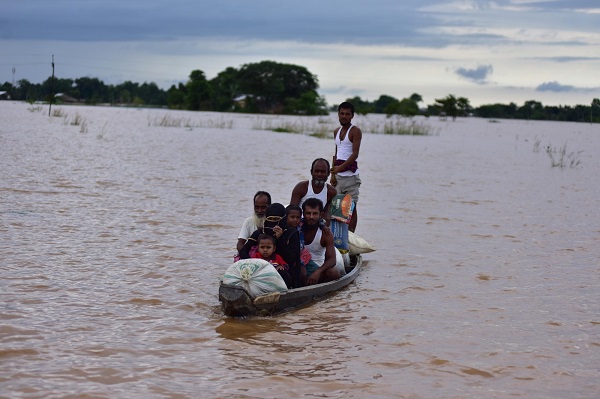
Guwahati,(Samajweekly) Assam’s flood situation has significantly improved in the past ten days, with the number of affected people declining by over two-thirds to nine lakh as on Sunday against 28 lakh on July 24, officials said.
The respite in the monsoon rains since July 24 lay behind the improvement in the flood situation in Assam and other northeastern states, India Meteorological Department (IMD) officials said.
Assam State Disaster Management Authority (ASDMA) officials said that nine lakh people in 1,087 villages continue to be distressed, though the number has dropped since July 24 when over 28 lakh people in 2,543 villages of 26 districts were affected.
A total of 51,770 hectares of crops are still flooded, but the area has come down from 122,573 hectares as on July 24.
According to officials, of the 9 lakh affected people in 19 of the 33 districts, 6.26 lakh are in the state’s six western districts — Goalpara (303,937), Morigaon (107,578), Bongaigaon (63,194), Barpeta (41,716), Golaghat (26,184), and Dhubri (27,930), as well as the eastern district of Lakhimpur (55,691).
The ASDMA officials said that six major rivers, including the Brahmaputra, are in spate at many places in nine districts, including Sonitpur, where both the Brahmaputra and Jia Bharali are flowing over the danger level.
There was no loss of lives reported on Saturday and Sunday, though the floods have so far left 109 persons, including women and children, dead in 22 districts, while 26 others were killed in landslides since May 22.
Forest officials said that at least 147 wild animals have died due to the deluge and 170 have been rescued, even as over 50 per cent of the 884 sq km Kaziranga National Park remains inundated. Ten days ago, 95 per cent had been flooded. The animals that have died in the annual monsoon floods include 16 rhinos, 105 hog deer, 11 wild boars, five wild buffaloes, three porcupines and two swamp deer.
Officials said that besides Kaziranga, located on the edge of the eastern Himalayan bio-diversity hotspots of Golaghat and Nagaon districts, the Manas, R.G. Orang and Tinsukia national parks, and the Pabitora and Tinsukia wildlife sanctuaries were also affected.








